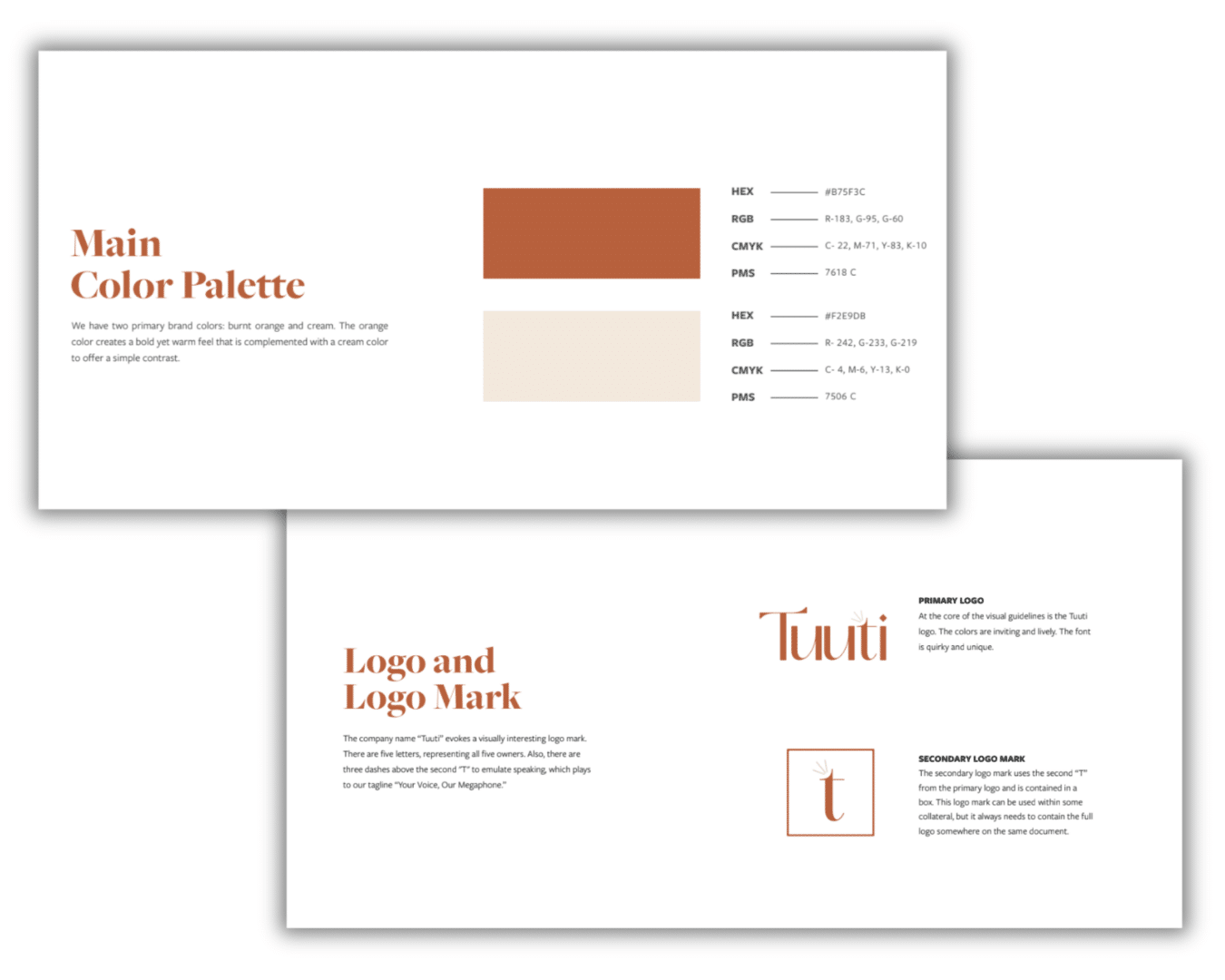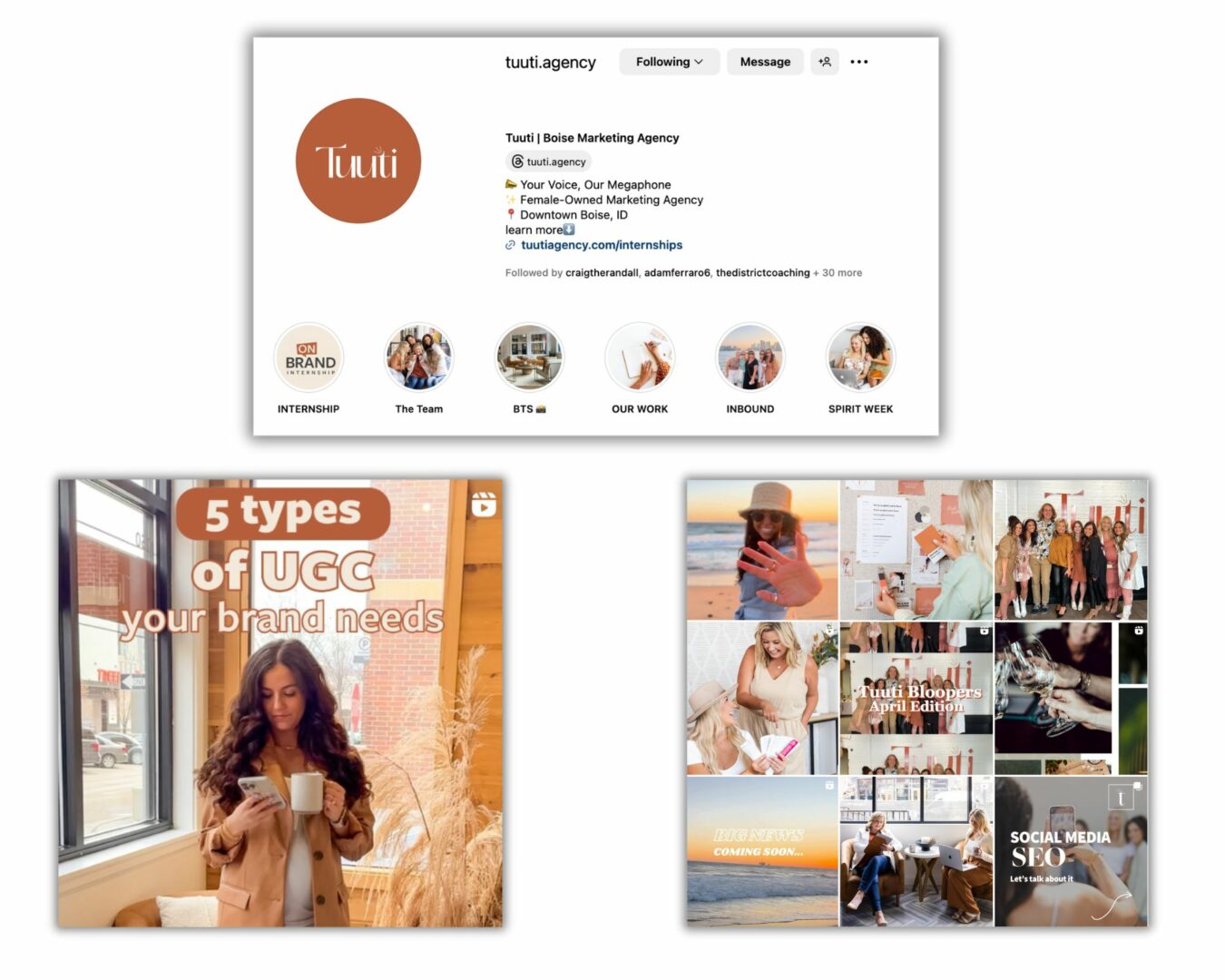Here at Tuuti Agency, we often find ourselves saying, “that’s so Tuuti” or “that’s so on brand.” Our brand story and identity has always been a key part of our marketing and content strategy as an agency. We choose to lean into it. We seek out clients that align with our values, off-the-wall creative ideas, and quirks.
There’s so many companies and brands out there, and it can be hard to stand out from the sea of sameness. Here’s an example for you: When we first picked our company name, we went through hundreds of different name ideas. Every time we thought we came up with something new and original, it was taken. Finally, we landed on Tuuti — which thankfully wasn’t taken and fits us perfectly.
The moral of our naming story is solidifying a brand identity isn’t always easy. It takes countless iterations, brainstorms, and team pow-wows. You can’t just slap a pretty logo up and some social posts and call it good. To have a real standout brand, it’s something you are always building and growing.
So where do you start? And what are the key areas to develop your brand identity?
1. Brand Development and Creative
First up is a no-brainer, and what you probably think of when you hear the words “brand” or “branding.” Brand development and creative design are typically step one in establishing a brand identity. Your branding communicates who you are as a company and what you stand for. Every aspect of your visual identity, from logo design to typography choices to imagery you use, contributes to the overall perception of your brand.
Consistency is key here. To build trust and reinforce brand recognition, your branding elements should be applied consistently across all touchpoints. That’s why so many companies create a Brand Guide that lays out all the details of their branding, including logo use case, font, color palettes, and so on. Your branding and creative design set the stage for all other aspects of your marketing strategy to align seamlessly with your brand identity.

2. Content and Messaging
What you say and how you say it matters. That’s why you need to establish a clear brand voice as part of your brand identity. Just as you want a consistent look and feel to your brand, you want consistent communication. Whether it’s through website copy, blog articles, marketing materials, newsletters, social media posts, customer service interactions, or even internal communications, your brand voice should remain true to your brand’s essence.
The tricky thing here is in the long run, you won’t have just one person writing on behalf of your company, and everyone has their own unique style. That’s why one of our first recommendations for growing companies is a Voice Guide. This comprehensive document covers various aspects of your brand’s communication style, including tone, language preferences, preferred words and phrases, and even guidelines for addressing sensitive topics. A Voice Guide empowers your team to speak with one voice, regardless of who is delivering the message or which platform it’s being shared on, so all your communication stays “on brand.”
3. Social Media
One of the first ways someone will interact with your company is through social media. Think of it as your “first impression.” And we all know first impressions are hard to overcome, especially if they are negative! Which is exactly why it’s crucial your social media represents your company and is “on brand” so you attract the right followers. The other important thing to remember here is social media is also how most of your existing audience stays in touch. So everytime someone lands on your accounts, you want them to be cohesive and consistent with your branding, voice, values, etc.
There’s lots of little ways to stay true to your brand on social media. Start by using branded templates for your posts to maintain a consistent visual style that aligns with your overall branding. Your company bio is another crucial element to focus on. In your own unique brand voice, it should succinctly communicate your brand’s mission, values, and USPs. The day-to-day language you use for engagement should also reflect your brand voice so it resonates with your target audience. This is just the beginning — there’s so much more you can do! For social, being “on brand” is in the details.

4. Public Relations and Media
When we launched our agency, a few of our first steps early on included sending out press releases, booking some podcasts, reaching out to local media, and putting up billboards in our local area. Why? For brand awareness. We needed to capture people’s attention, especially in Boise as a new creative communications marketing agency. It was not only a way to get our name out there, but our story as well. Within the first month, people recognized our logo and branding, and we were the talk of the town. PR is a fantastic way to get brand awareness, but you also need to put in the work to make sure you are telling the right story and using the right messaging.
Your PR efforts should align with your brand identity and values, and with what you’re doing across all other channels. Whether it’s through press releases, media interviews, or sponsored events, every opportunity to share your story should reinforce your brand’s message and positioning in the market. The other great bonus of PR is it allows you to control the narrative surrounding your brand. By proactively managing your brand’s reputation and fostering positive relationships with the media, you can respond effectively to any potential crises or negative publicity so your brand identity stays positive in the public eye.
5. Your People
Last but certainly not least is your people. Who you hire and who represents your company on a daily basis is huge! Your team members are the face of your brand, interacting with customers, clients, and community members on a regular basis. Ultimately, your people are instrumental in bringing your brand to life and shaping the perceptions of your audience.
When hiring, look for candidates who are not only skilled but also align with your brand’s mission and vision. This goes for everything from full-time team members to interns! At Tuuti, we include a culture call as part of our interviewing process to ensure the candidate fits our company culture. Investing in onboarding and training resources can also help your team members better understand your brand values. By fostering a strong company culture and hiring the right talent, you can empower your employees to be your biggest brand advocates.

Find Your “On Brand”
So there you have it — the top 5 places to focus on if you want to build your brand identity. As a creative communications marketing agency, we found that pouring more time and resources into these areas gives you the best response for brand recognition and audience engagement. Remember, consistency is key, especially when working across multiple channels. Also, don’t be afraid of writing your own unique story and bringing a quirky flair to your brand; if you nail your brand identity, the right audience will connect to you. Now get out there and find your own way of being “so on brand!”
Ready to take your brand identity to the next level? Building brand identity and awareness is our speciality! Reach out to learn how we can amplify your brand voice.







